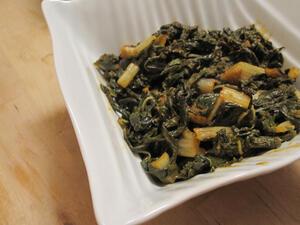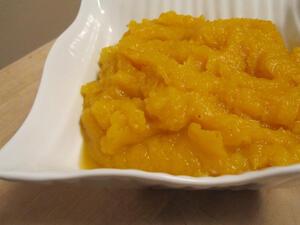Eating Jewish: North African salads for Rosh Hashanah
Not only is it almost the beginning of a new year, but the weather is beginning to change and the tomatoes, zucchini and corn that have been so plentiful over the summer are being replaced by squash, apples, pears, figs and a multitude of other autumn fruits and vegetables. The availability of all this fantastic produce has made the High Holidays one of my favorite times on the Jewish calendar to be cooking. This is especially true for Rosh Hashanah, when the food symbolism of the holiday necessitates the use of seasonal fruits and vegetables.
The dishes I chose to prepare showcase two seasonal vegetables, namely Swiss chard and butternut squash, and come from Joan Nathan’s latest cookbook Quiches, Kugels, and Couscous: My Search for Jewish Cooking in France. In this cookbook, Nathan explores the cuisine, history and identity of French Jews. With the third largest Jewish population in the world after the United States and Israel, the Jewish community of France is diverse. Jews from places such as Eastern Europe, Spain, Portugal, and North Africa have settled throughout the country, bringing their culinary traditions with them and in this cookbook readers get a strong sense of just how varied the cuisine of this community is. We also come to understand the way in which Jews adopted the traditions of the regions in which they’ve lived. Nathan writes, “Ashkenazic, Sephardic, and Provençal Jewish food developed side by side and often melded with French regional cooking.” This cookbook is an incredible mix of recipes of which some have a strong French influence, such as Cassoulet with duck and lamb, while others are more distinctly North African or Eastern European.
The cooked salads I chose for this post come from the large North African Jewish community in France, and both the butternut squash and the Swiss chard play a symbolic role in seders which are held by Sephardic Jews during Rosh Hashanah where blessings are recited over squash, leeks, black-eyed peas, Swiss chard or beet greens, the head of a fish or a lamb, pomegranates and dates. Whether served at the start of your holiday meal as mezzes or as side dishes to the main meal, these two salads contain simple yet stunning flavor combinations. The Swiss chard is perfectly complemented by the cumin, which provides an earthy note, while the addition of the lemon brightens and brings together all the flavors. The butternut squash dish is a great way to use this vegetable in something other than the ubiquitous soup. Although the recipe called for the butternut squash to be served warm, immediately after the harissa, coriander and other ingredients have been mixed in, I think it tastes best at room temperature once all the flavors have melded together. I was surprisingly pleased by the way in which the sweetness of the butternut squash matched the spiciness of the harissa and the nutty citrus flavor of the ground coriander.
Do you enjoy cooking with the seasonal produce available during Rosh Hashanah and the other High Holidays just as much as I do? I would love to hear about your favorite dishes that highlight the bounty of this season.
Moroccan Swiss Chard Salad (Salade de Blettes)
Adapted slightly from Joan Nathan’s Quiches, Kugels, and Couscous
About 2 tablespoons vegetable oil
3 cloves garlic, finely chopped
2 bunches of Swiss Chard, cleaned of all dirt, stems removed and chopped
1 teaspoon sweet paprika
1 teaspoon ground cumin
1 teaspoon harissa, or to taste depending on how spicy you want it to be
Juice of one lemon
Salt to taste
Freshly ground pepper to taste
-
Heat the oil in a medium skillet and sauté the garlic until it is fragrant. Add the Swiss Chard and cook for a few minutes until it begins to soften.
-
Sprinkle in some salt, the paprika, cumin and harissa. Cook the mixture for another minute, all the while making sure to stir it.
-
Pour the lemon juice into the skillet and cook until the liquid in the pan begins to evaporate (there should be very little liquid in the skillet at this point). Season with salt and freshly ground pepper. Serve at room temperature.
Tunisian Winter Squash Salad with Coriander and Harissa
Adapted slightly from Joan Nathan’s Quiches, Kugels, and Couscous
1 pound butternut squash or kabocha squash, peeled and cut into large chunks
1 teaspoon salt and more to taste
1 large clove garlic, peeled
1 teaspoon harissa
¼ teaspoon ground coriander
Juice of ½ a lemon
About ½ tablespoon extra-virgin olive oil
6 cups water
-
Bring 6 cups of water to a boil in a large pot and add the squash, the salt and the garlic clove. Lower the heat and simmer until the squash is very tender, approximately 20 minutes.
-
After draining the pot, place the squash and the garlic in a mesh strainer. Mash the two together to get rid of any water (if there are pieces of garlic clove remaining after the mixture has been mashed, simple discard them). Place the mixture in a large bowl and stir in the harissa, coriander, lemon juice, olive oil and salt to taste. Adjust the seasonings and let sit for about 20 minutes so the flavors can meld together. Serve at room temperature.








